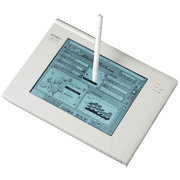The AMiTY was a pen-interface computer designed to feel like using pen and paper in the application of reception duties at information counters, for sales-support tasks such as managing customer information and providing consulting services, and for maintenance services such as patrols or regular inspections. Mitsubishi Electric announced the AMiTY in 1993. The cordless pen, which worked by electromagnetic induction, was used for menu selections, editing with gestures, direct entry of text and drawings in simple operations.
The AMiTY was the industry’s smallest pen tablet with a built-in hard disk drive. The case was made of carbon-fiber-reinforced plastic, and the computer was loaded with a 3.3 volt, low-power 20 MHz i386SL CPU, 4 MB of main memory (expandable to 8 MB), and a 1.8-inch 40 MB hard disk drive. Despite this, the A4 tablet was only 25.4 mm thick and weighed just 1.4 kg.
The screen was a 9.4-inch monochrome backlit LCD. The surface was specially coated with a non-slip sheet to keep the pen from slipping and to give a pen-and-paper tactile feel. The coating also reduced reflections from fluorescent lights and other light sources. The AMiTY ran the Microsoft Windows for Pen Computing operating system.
The AMiTY was standard equipped with two IC card slots, a JEIDA 4.1/PCMCIA 2.0-compliant Type I (3.3-millimeter wide)/Type II (5.0-millimeter wide) slot and a Type III (10.5-millimeter wide) slot. These slots enabled a wide array of system configurations, including LAN and WAN connectivity.
The AMiTY could be used for presentations as well by connecting it to a large VGA color CRT or to an LCD projector. The external monitor would display in sync with the pen tablet’s LCD screen.
| CPU | i386SL (20MHz)3.3V | |
|---|---|---|
| High-speed math coprocessor (optional) | Equivalent to an i387SX (20 MHz) | |
| Memory | Cache memory | 16KB |
| ROM | 128KB | |
| RAM | 4MB(expandable up to 8 MB) | |
| Storage memory devices | Hard disk drive | One 1.8-inch 40 MB drive |
| External flexible disk drive (optional) | One 3.5-inch 1.44 MB drive | |
| Display device | Display method | VGA 9.4-inch monochrome backlit LCD screen, 16 gradations |
| Japanese mode | Resolution: 640 x 480 pixels Japanese: 40 characters x 25 lines, 16 x 19 pixels Alphanumeric: 80 characters x 25 lines, 8 x 19 pixels |
|
| English mode | Resolution: 640 x 480 pixels (VGA) 640 x 350 pixels (EGA) 640 x 200 (CGA) Alphanumeric: 80 characters x 30 lines, 8 x 16 pixels 80 alphanumeric characters x 25 lines, 8 x 14 pixels or 8 x 8 pixels |
|
| External monitor (optional) | Connectable to a 14-inch color monitor | |
| Input devices | Stylus pen | Electromagnetic induction cordless pen |
| External keyboard (optional) | 106-key JIS keyboard, AX keyboard | |
| Mouse (optional) | RX232-C interface, PS/2 | |
| Interfaces | RS-232C | One channel, standard (D-sub 9 pin, asynchronous) |
| Printer | One channel, standard (Centronics interface, D-sub 25 pin) | |
| External flexible disk drive | One channel, standard | |
| External monitor | One channel, standard | |
| External keyboard | One channel standard (6 pin mini DIN) | |
| IC card | Two slots, standard (PCMCIA 2.0-compliant, one Type II and one Type III slot) | |
| Power supply | 100 VAC ± 10%, 50/60 Hz ± 1Hz | |
| Power consumption | 49VA | |
| Power consumption | 21J/S | |
| External dimensions [mm] | 297 x 210 x 25.4 (w x d x h) | |
| Weight | 1.4kg | |


